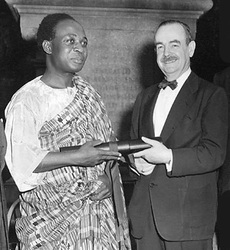
Established on 22nd June 1985, the W.E.B. Du Bois Centre for Pan-African Culture in Accra stands as a living memorial to one of the most influential scholars, civil rights pioneers, and Pan-Africanists of the 20th century — Dr. William Edward Burghardt Du Bois.
What you can find in DuBois` Personal Library
There are 21 books written by Dr. DuBois. Other books, collected by Dr. DuBois are 1,300 in number. They are categorized into special areas; Several Issues of "Freedom Ways", a quarterly review of the Freedom Negro Movement - Negro History.
- Race and Politics
- Negro Poetry
- Books in French
- Books in German
- Science
- Middle East
- The Caribbean and South America
- Fiction
- Asia
- Asia and Middle East
- Russian
- Chinese
- Soviet Union
- Biographies of African Americans
- West Africa
- European History
- Language
- Africa
- South Africa
- Central Africa
- North Africa
- Who's Who
- Negro Music
- Honorary LLD 1938 , Fisk University, USA
- PhD in History and Government 1896, Harvard University, USA
- BA Social Sciences and Philosophy, Fisk University, USA
- Honorary LLD 1930 Howard University, USA
- Homorary Doctor of Letters, University of Ghana 1963
- Honorary LLD 1938, Fisk University, USA
- BA in Political Economy 1890, Harvard
There are also Gifts from Czecoslovak Government(1959) and also Gifts from Harvard University, USA
Welcome to a space where history speaks, and heritage lives on.
